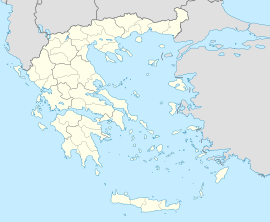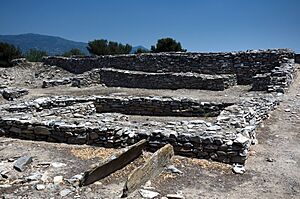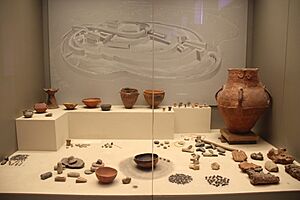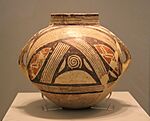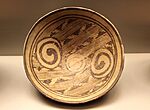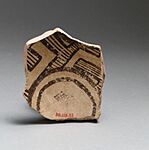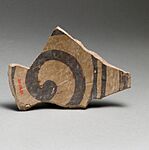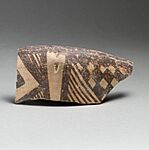Dimini facts for kids
Quick facts for kids
Dimini
Διμήνι
|
|
|---|---|
| Country | Greece |
| Administrative region | Thessaly |
| Regional unit | Magnesia |
| Municipality | Volos |
| Municipal unit | Aisonia |
| Population
(2021)
|
|
| • Total | 2,102 |
| Time zone | UTC+2 (EET) |
| • Summer (DST) | UTC+3 (EEST) |
| Period | Neolithic Europe |
|---|---|
| Dates | circa 4800 BCE — circa 3200 BCE |
| Preceded by | Sesklo culture |
| Followed by | Eutresis culture |
Dimini (Greek: Διμήνι) is a small village in central Greece. It is located near the city of Volos, in a region called Thessaly. Dimini is known for its very old settlements.
Archaeologists have found two main ancient sites here. One is from the Neolithic period, which was a long time ago. The other is from the Mycenaean period, which came later. These discoveries help us learn about ancient Greek life.
Scientists believe that the palace of ancient Iolcos might be in Dimini. In 2001, a Mycenaean palace was found during excavations. This was a very exciting discovery!
Contents
Exploring Ancient Dimini
Life in the Neolithic Age
The Dimini culture is famous for its unique pottery. People from this time made beautiful pots with painted designs. These designs were often abstract, meaning they used shapes and patterns.
This special pottery was made during the Later Neolithic period. It was mostly found in eastern Thessaly. But some pieces have been found far away, showing that people traded these items.
Discoveries from the Mycenaean Period
Archaeologists have been digging at Dimini for a long time. In 1886, two researchers found a Mycenaean tomb. It was a special type of tomb called a tholos tomb.
Later, in 1901, another tholos tomb was found on a hill. More excavations happened in the 1900s. In 1977, George Chourmouziadis continued to explore the Neolithic site.
In 1980, new digs started at the Mycenaean settlement. In 2001, these excavations uncovered a Mycenaean city and palace. Experts believe this could be part of the ancient city of Iolkos. They also found a stone weight and a piece of pottery with Linear B writing. Linear B was an ancient writing system used in Mycenaean Greece.
The Sesklo and Dimini Cultures
For a long time, some historians thought the Dimini people attacked the Sesklo culture. This idea was called the "invasion theory." It suggested that the Dimini and Sesklo people were completely different groups.
However, new research tells a different story. Scientists used a method called thermoluminescence dating. This helps them figure out how old ceramic materials are. They found that people lived in Dimini around 4800 BC. This was about 400 years before the Sesklo civilization ended around 4400 BC.
This means that the Sesklo and Dimini cultures likely lived side-by-side for a while. They probably did not fight each other as much as once thought.
See also
- Helladic chronology
- Mycenaean Greece
- Neolithic Greece
- Old Europe
- Sesklo and Dimini fortifications
 | Sharif Bey |
 | Hale Woodruff |
 | Richmond Barthé |
 | Purvis Young |


